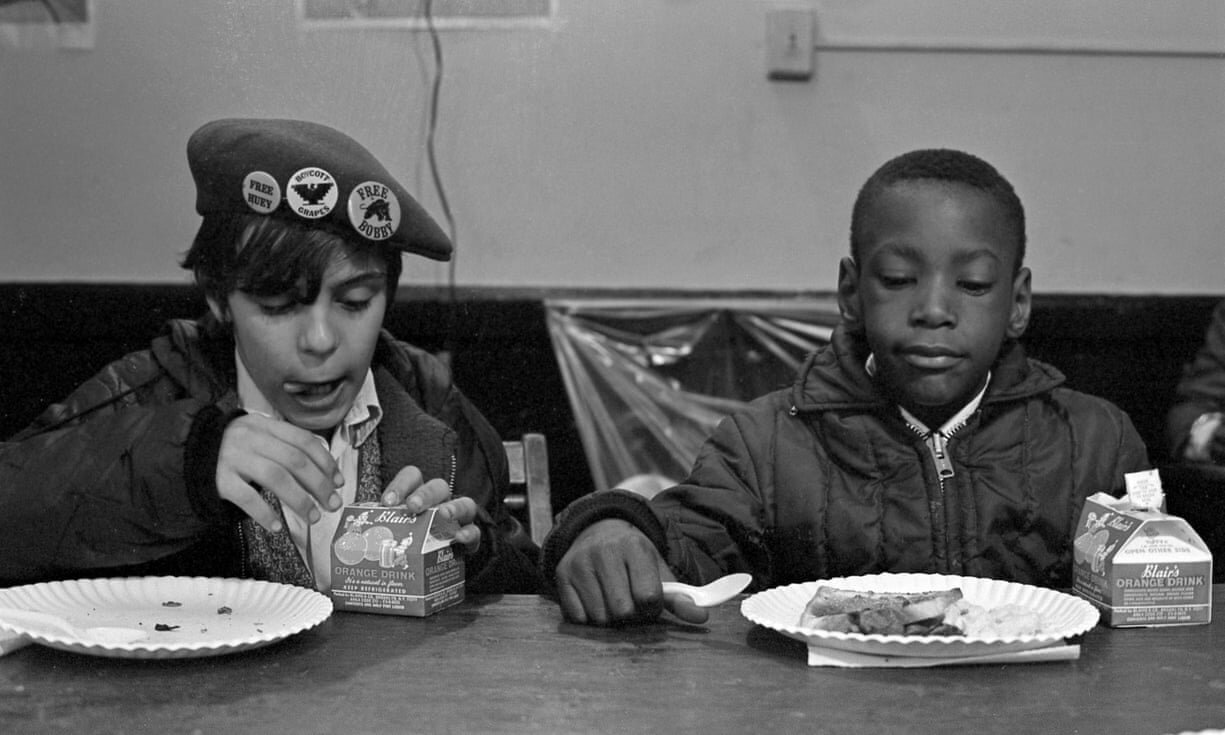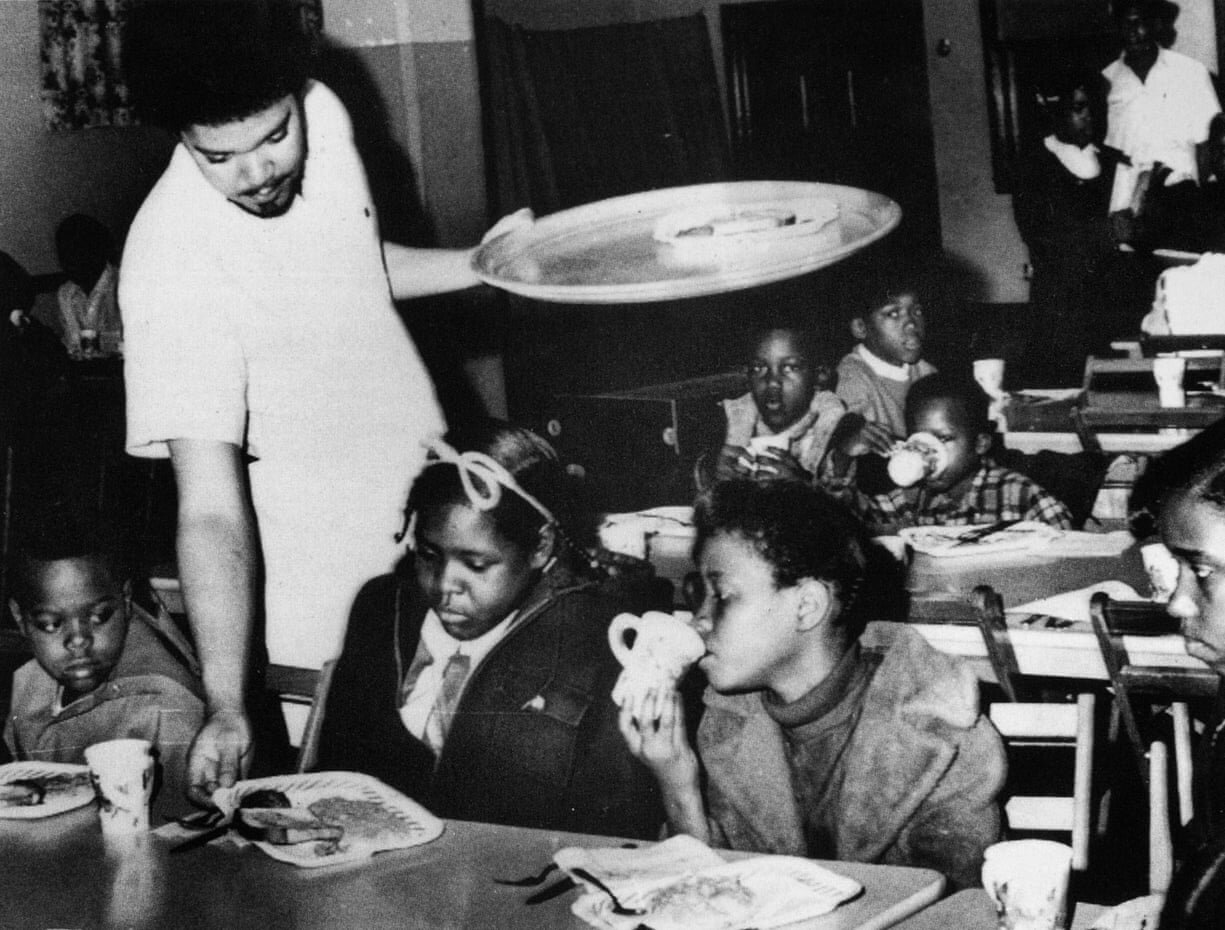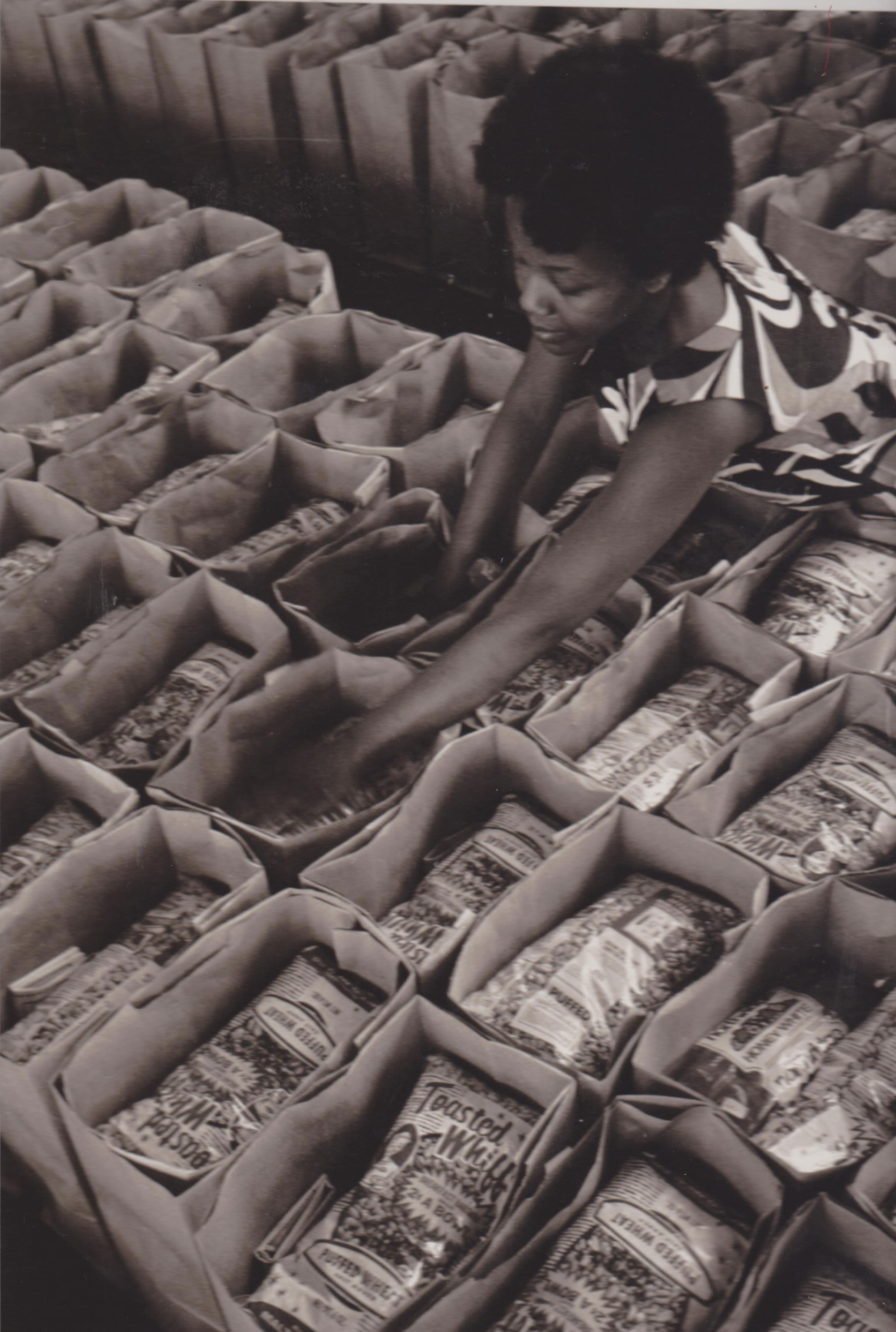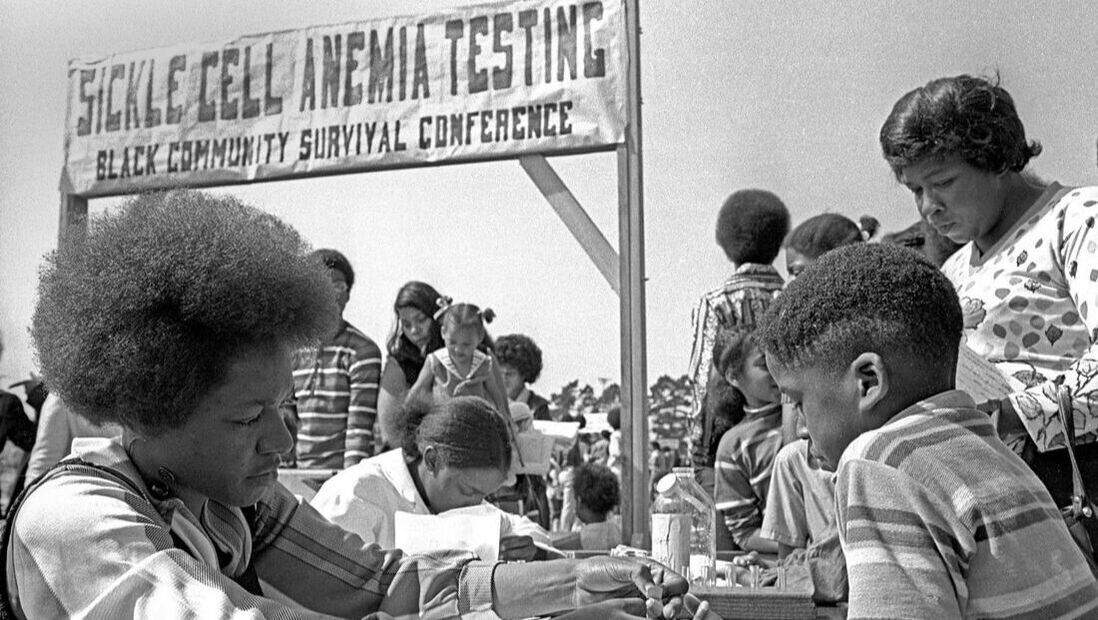History of the Black Panther Party
The Black Panther Party for Self Defense (BPP) was founded in October 15, 1966 at Merritt College in Oakland, California by Huey P. Newton and Bobby Seale. It was a direct, active, communal response to the ways in which Black people have been systemically and institutionally disenfranchised in American society. The Panthers put their comprehensive Ten-point Program into action through their over 60 Survival Programs that included everything from free breakfasts for school children to free sickle cell testing. Volunteers were asked to serve the community “body and soul.” The BPP also founded the renowned Oakland Community School, a liberating space for children. These initiatives highlight the importance of mutual aid as necessary for self determination.
Below you will find more resources pertaining to the history of the Panthers. Though many members of the BPP were targeted, jailed, and even killed by the hands of state and federal government, their legacy lives on through the deep and permanent impact made locally and internationally in the ongoing struggle for the liberation of all people.
We hope that the work of the Panthers and the resources on these pages will inspire you as much as they have inspired us to action. We will continue to update and expand these documents. To recommend a resource please email eat@peopleskitchencollective.com.
All Power to the People.
General Resources
Black Panther Party’s Ten-Point Program
This historic document, originally written in 1966, is something we return to as an anchor. Participants in our workshops are often surprised at how relevant these demands still are over 50 years later.
Questions to reflect on: What values are important to your communities? What does your community need? What would you add or shift to these ten points?
Vanguard of the Revolution (2015)
This documentary features historic footage and contemporary interviews with BPP alums. It both gives an overview of the party and contextualizes it within other movements at the time.
Agnés Varda Black Panthers (1968)
Made in 1968, this 30-minute documentary chronicles a Free Huey Rally in the Panthers “own words and images” as narrated by filmmaker Agnés Varda.
All Power to the People: Black Panthers at 50
Curated by the Oakland Museum of California (OMCA), this website for the groundbreaking exhibition contains a video playlist and a reading list. A portion of the widely popular exhibition is on permanent view as part of Black Power.
Educate To Liberate: A Black Panthers Syllabus By The Oakland Public Library
This resource for teachers and students features books, films, audio and lesson plans for Grades K-12.
Women in the Black Panther Party
The Rank and File Women of the Black Panther Party and their Powerful Influence
50 women of the Black Panther Party
Seeing Black Women in Power
An extensive list of resources inspired by the story of the first female member of the BPP and high school student, Joan Tarika Lewis. She came into a meeting and demanded that women be a part of the Black Panther Party.
polynesian panthers
Dr. Melani Anae, a senior lecturer in Pacific Studies at the University of Auckland, keeps holding the Panther line in fighting for a fair go for Aotearoa’s Pasifika communities.
interview with panther ericka huggins
A Q&A with Ericka Huggins by Rasa Caffe. Huggins reflects on the events of 2020 and shares how we move forward.
Children sit to eat at a free meal provided by the Black Panther Party. | Stephen Shames and Ducho Dennis | It’s About Time
Boys eat during a free breakfast in New York, winter 1969. Photograph: Bev Grant/Getty Images
Bill Whitfield of the Black Panther party serves breakfast To local children in Kansas City, April 1969. Photograph: Granger/Rex/Shutterstock
A cook prepares meals for the free breakfast program. | It’s About Time
Survival Programs
The Black Panther Party: Service to the People Programs
A compilation of original documents sent to chapters of the BPP nationwide to implement Survival Programs, this incredible resource brings to light the thought, detail, and intersectional approach to the Panther’s service programs. Includes select speeches and poetry. For a full list of books see the Oakland Public Library
8 Black Panther Party Programs That Were More Empowering Than Federal Government Programs
This article highlights just 8 of more than 60 programs created by the BPP.
Black Panthers’ Oakland Community School: A Model for Liberation
Reflections on the Oakland Community School by the Black Organizing Project, who organized to have police removed from Oakland Unified School District public schools.
Remembering Ruth Beckford, co-founder of the Free Breakfast Program
Local history podcast remembers Ruth Beckford, the legendary choreographer who first suggested the Free Breakfast Program at St. Augustine’s.
Archives
It’s About Time
Compiled by Black Panther Party archivist and former Panther Billy X. Jennings, the Black Panther Party Alumni website documents the legacy of the revolutionary organization that served tens of thousands of people through their survival programs and continues to impact our collective political vision and practice to this day.
Freedom Archives: Black Panther Party
The Freedom Archives contains over 12,000 hours of audio and video recordings as well as print materials dating primarily from the late-1960s to the mid-90s. These collections chronicle the progressive history of the Bay Area, the United States, and international movements for liberation and social justice.
Black Panther Party Community News Service: Volume 1, Volume 2, Volume 3, and Volume 4
Following the police murder of community member Denzil Dowell, the Panthers published the first party newspaper. The Black Panther Intercommunal News Service was a weekly periodical with national and international distribution. It was published for 13 years, starting in 1967. In its heyday, the Party sold several hundred thousand copies of the newspaper per week.
The National Archives: The Black Panther Party
The National Archives and Records Administration contains over 2,400 records relating to the Black Panther Party. Most of these records are textual records, but there are also motion pictures, sound recordings, and photographs.
Pacifica Radio Archives: The Black Panther Party
This collection of audio recordings documents speeches, interviews, news coverage, and documentaries by or about the Black Panther Party broadcasted on Pacifica Radio stations between 1966 and 1989. It includes the voices of many notable members of the Panthers, including Huey P. Newton, Eldridge Cleaver, Bobby Seale, H. Rap Brown (Jamil Abdullah Al-Amin), Kathleen Cleaver, and Elaine Brown.
Black Panther Party Collection - Bay Area Television Archive
Bay Area newsfilm and privately produced footage relating mainly to the Black Panther Party's Oakland Chapter from the 1960s & 70s.
Bags of groceries are arranged to be given away to the community. | Stephen Shames and Ducho Dennis | It’s About Time
Sickle cell anemia testing at the Black Community Survival Conference, March 30, 1972 | Photo by Bob Fitch | Source: Bob Fitch Photography Archive, Stanford Libraries
PKC Exclusive Resources
Feeding the Revolution: A Conversation Between Mila Terry-Koon and Ericka Huggins
A very special conversation between a 10 year old artist and activist Mila Terry-Koon and Ericka Huggins, BPP alum and former director of the renowned Oakland Community School.
An interview with Emory Douglas
As the revolutionary artist and Minister of Culture for the Black Panther Party for Self Defense, Emory Douglas created the art for the Party's newspaper and iconic posters.
Panther archivist Billy X. Jennings
Excerpt from an interview with collaborator and archivist.
Notes on the Black Panther Party’s Food Programs
This 8-page resource compiled by People’s Kitchen Collective community member Yuri Miyagawa contains extensive research and multimedia links. It includes notes on solidarity with the United Farmworkers, their support of the Disability Rights Movement, the BPP legacy and the food justice movement today.
